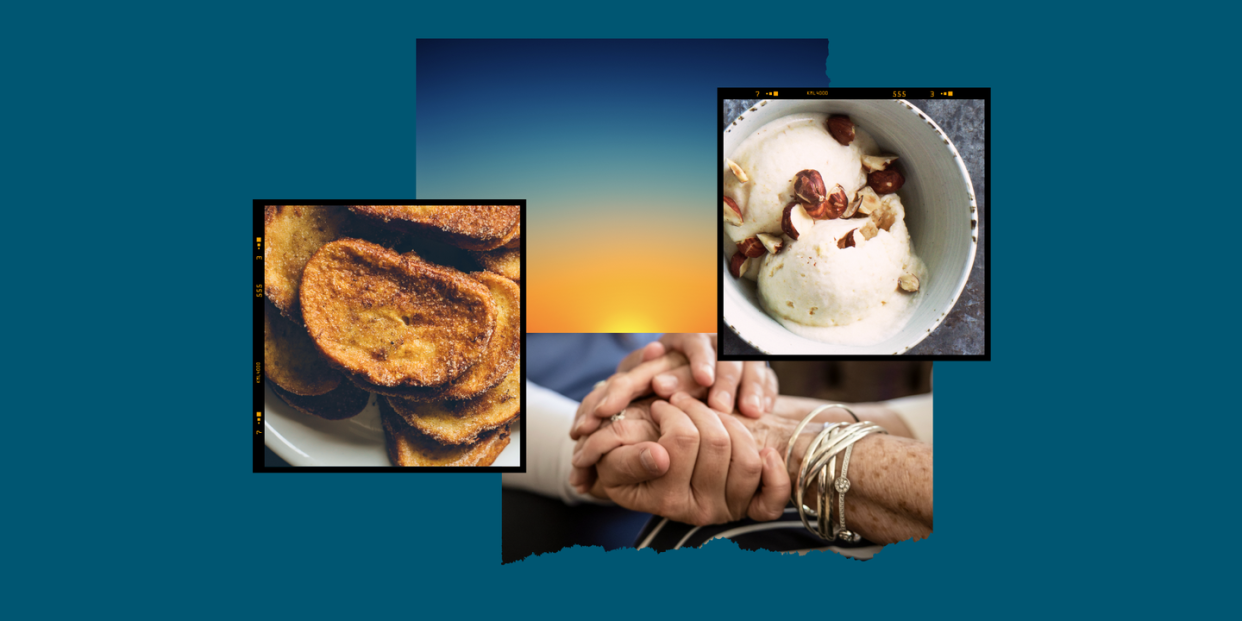What My Best Friend Taught Me About Dying


Put down your coffee, your bagel, and imagine for a minute that you’re dying. I’m kidding! Because you’re dying already! We all are. Our lives—they’re finite. And you wouldn’t, say, quit eating just because you’re certainly going to be dead at some point, right?
For the past three years, I’ve cooked dinner every Monday as a hospice volunteer, and I’ve learned that you don’t necessarily stop feeling a bit snacky just because your days are numbered. You might still like a handful of Doritos with your ginger ale. You might still like a twice-baked potato blanketed in melted cheese, even if you remember only the word ball and have to pantomime the rest using the side of your hand as an imaginary knife. You might be craving a hot dog, split and griddled, squiggled with yellow mustard. You only have to let the soft animal of your body love what it loves, as Mary Oliver wrote, even if what it loves is a macaroni something called American chop suey.
Sometimes it’s like this: I cut a piece of cinnamon toast into a four-by-four grid, and the resident picks out one square centimeter, chews it thoroughly, spits it discreetly into a napkin, and pushes the plate away. Another resident rolls her merry eyes when I ask about a drink. “I came here to die! Don’t offer me coffee.” “So no drink?” I say, and she sighs, asks what I’ve got, laughs when I say, “Hemlock?” and cheerfully sips some cranberry juice cocktail. Still another resident drinks Fresca because she’s on a diet. There is warm prune juice, thickened liquid, broccoli-cheddar soup, lasagna pureed in the Magic Bullet and fed with a spoon to the man who looks down my shirt when I bend over him, waggles his white eyebrows, even though when I walk by a bit later I see him feeding himself quite ably. Even though he will be dead the day after tomorrow.
I’m like a candy striper crossed with the grim reaper, and it’s not that different from waitressing. I walk quickly through the halls, holding my head straight so the requests don’t spill out: Coke, chowder, meatloaf, an inch of milk warmed in the microwave for exactly 20 seconds. “Tell the chef,” one resident used to say, irritably—that the steak was tough, that the soup was underseasoned, that the pizza was too much like pizza. All things I’d made myself. “I’ll tell her,” I’d say. One time, though, he kissed my hand and told me he loved me. “You’re just happy about your ice cream sundae,” I said, and he said, “That may be true.”
But we do want to be loved, don’t we? Even by relative strangers. Even by dying people and hardworking certified nursing assistants. We all have these giant holes, and we are grabbing people up, stuffing them in. Or I am, at least. My 22-year-old son and I argue about whether being a hospice volunteer is a selfless act—only neither of us can remember the word for it. “Hedonism?” I say, and he laughs. “Mama,” he says. “I don’t think it’s hedonism.” But I think maybe it’s hedonism. He makes gentle fun of me because the hospice emails us whenever someone dies, and I am always reading my email and saying “Oh!” in a surprised way. We once camped in the desert near a bunch of tripping college students, and one of them pointed to the night sky and cried, “There’s a star! There’s another!” And then we lay there all night listening to him say, “Star. Star. Star star star oh my God! Star star star star star!” It’s so beautiful, being human. It’s so ridiculous.
My best friend died in hospice, and I want to tell you this, in case you ever spend time with a dying beloved: It can be strangely normal. It can be strangely dull. You might picture sustaining all the high notes of depth—profound conversations about consciousness or forgiveness—only to be surprised by the body doing its bodily things. Maybe you want to get absolution or grant it, but your person wants a hard candy, a cold washcloth, a sip of water, a dish of maple-walnut ice cream. Four ice cubes in a glass with exactly one inch of single-malt scotch. A slick of lip balm, a Fudgsicle, the curtains opened or closed on the birds who are at the feeder outside, eating their birdseed and singing about it.
I want to tell you this, too: It’s okay. It’s okay that it’s boring sometimes. That it’s scary. That it’s not as lovely as you pictured—or that it’s lovelier. It’s okay if you spend your last moments with somebody helping them figure out how their TV remote works or sitting quietly for the hour it takes them to chew and swallow a grilled-cheese sandwich. Let the soft animal of your body do its soft animal thing. Let it perk up its ears. Let it narrow its eyes. Let it yield to heartache. Let it rest. Let it be.

Catherine Newman’s fiction debut is We All Want Impossible Things (Harper, November 8). Her work has appeared in numerous publications, including The New York Times, O, The Oprah Magazine, The Boston Globe, and Redbook. She is the etiquette columnist at Real Simple and editor in chief of the James Beard Award-winning nonprofit kids’ cooking magazine ChopChop. Her New York Times Motherlode columns twice appeared on Best of the Year lists. She is also the author of Waiting for Birdy, Catastrophic Happiness, and One Mixed-Up Night and Nautilus Award winner for How to Be a Person.
You Might Also Like

